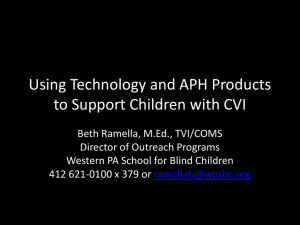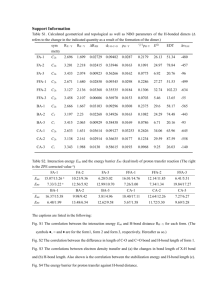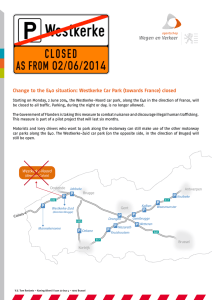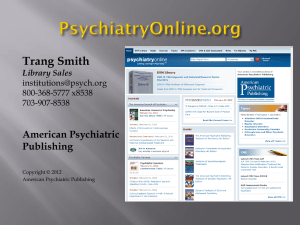Community Mental Health Care in Ghana
advertisement
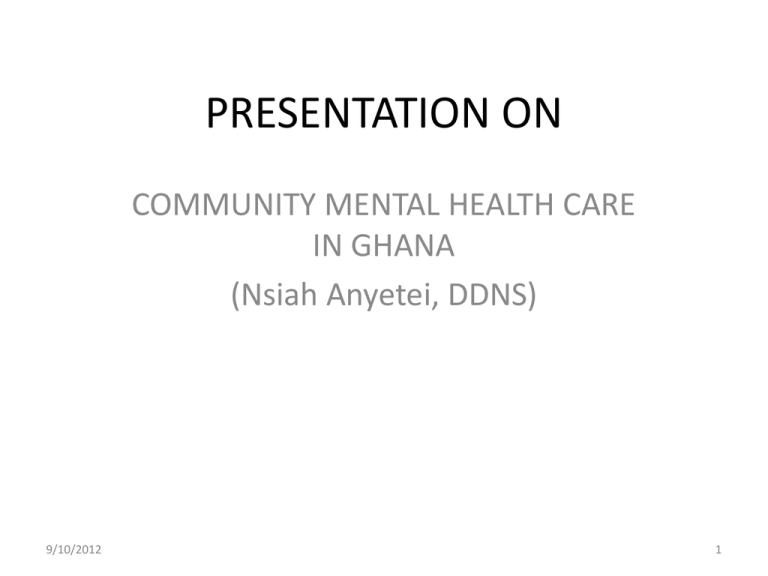
PRESENTATION ON COMMUNITY MENTAL HEALTH CARE IN GHANA (Nsiah Anyetei, DDNS) 9/10/2012 1 OUTLINE •Brief history of mental health care in Ghana. •Population growth and over centralization of mental health care. •Inception of Community Mental Health (CMH) Care in Ghana. 9/10/2012 2 CONT’D •Significance of the inception of CMH. •Making a successful home visit. •Various strategies and actions adopted to sustain CMH service. •Achievement chalked so far. •Challenges confronting CMH service. •Way forward. 9/10/2012 3 BRIEF HISTORY OF MENTAL HEALTH CARE IN GHANA 9/10/2012 Before the introduction of scientific medicine in the Gold Coast, mental illness was treated traditionally with herbal medicine and spiritual rites. In the early period of colonial rule, after the signing of the bond of 1844, mental patients were kept in prison, as practiced in most African countries. 4 CONT’D 9/10/2012 On February, 1888, by a legislative Instrument (LI) under the signature of the then governor Sir Edward Griffiths, the old High Court of Victoriaborg was converted into Lunatic Asylum. Patients were looked after by prison warders. No medical treatment. 5 CONT’D 9/10/2012 No real distinction made between the requirements of the mental patients and the criminals in prison. Over a time overcrowding in the prisons became a governance issue that ultimately promoted building of a new hospital in 1904 called lunatic asylum, currently the Accra Psychiatric hospital. It was commissioned in 1906 to accommodate 200 patient. 6 CONT’D 9/10/2012 Wards were manned by untrained Attendants till 1935, when First Lectures were given to Attendants and certificates awarded. Medical administrators started being posted to the hospital from 1928. Dr Maclagen, Dr E.F.B. Forster were among the pioneers. 7 CONT’D 9/10/2012 QRMN training took off from 1952 at the APH to improve patient management in the hospital. Scholarships were offered to distinguished ghanaians to specialize in psychiatric care at RMN level. Decentralization of psychiatric care became the single most potent approach to solve the problem of the ever increasing OPD attendance taking cognizance of the regions where these clients were coming from. 8 CONT’D An annex rehabilitation structure was opened at Atimpoku in 1959 for some 300 out of 1,700 patients at APH. Ankaful psychiatric hospital was opened in October, 1965 with 500 beds to cater for patients from the central, western, and ashanti regions, as well as the returnees from Atimpoku rehabilitation centre. 9/10/2012 9 CONT’D Pantang hospital was opened in 1975 as a modern psychiatric facility to serve as a hub to cater for patients from not only from Ghana but the entire West African sub- region and also to decongest APH. Pantang has capacity for 500 beds. 9/10/2012 10 POPULATION GROWTH AND OVERCENTRALISATION OF MENTAL HEALTH SERVICE 9/10/2012 Mental health care was overly centralized to the disadvantage of clients from the Ashanti and the Northern regions. The three big psychiatric institutions are located in the southern belt of Ghana. In other words, only two (2) regions out of the ten (10) regions have these specialized institutions. 11 CONT’D In similar comparative view, the only two (2) training institutions that train nurses for the service are also found in only two (2) regions that are also located in the southern belt. The APH has the capacity to accommodate 600 patients at any given time. The APH has never been able to achieve this status but continuous to be over crowded with an increasing patient population. 9/10/2012 12 CONT’D 9/10/2012 This has resulted in all time growing demand on the APH limited facilities. This has tended to compromise the comfort and general wellbeing of patients. This has indeed constituted an appreciable strain on all APH resources, i.e. working materials, staff and funds. 13 INCEPTION OF CMH SERVICES 9/10/2012 Initial attempts at deinstitutionalisation have been made: In 1959, 300 patients were moved to Atimpoku to go and work on farms to produce food to feed themselves under theme, rehabilitation of the mentally ill, Atimpoku social centre. Yesunkwa Rehabilitation Facility near Elimina- this was aimed to be an industrial as well as agricultrial training half way home for patients at Ankaful Psychiatric hospital. 14 CONT’D Budumburam social centreTreated mentally ill patients from APH were to be settled to engage in planned programme. A project sponsored by the Norwagian government and accepted the Ghana government. All these attempts NEVER yielded any appreciable returns. 9/10/2012 15 9/10/2012 TC PROJECT AT APH CMH started in a rudimentary approach at APH by Mrs. Pearl Addison, a British practicing CPN. She established Therapeutic Community in the wards through a British Technical Aid programme in 1973. 16 CONT’D 9/10/2012 The TC concept was to allow the patients on the wards to take part in the day to day administration of the of the wards so that when they go back home, they would have acquired basic social to enable them to get well integrated in the larger society. Before this the governing concept was custodial care. 17 CONT’D 9/10/2012 Mrs. Juliana Owusu, PNO, took over from Mrs. Addison and gave three (3) months orientation course initially to QRMN and Enrolled Nurses, and then later to SRN and they were transferred as CPNs, to the regions. Western region started and then spread throughout the country. 18 CPN DISTRIBUTION REGION NUMBER GREATER/ACCRA 68 CENTRAL 6 WESTERN 26 EASTERN 40 BRONG-AHAFO 20 VOLTA 25 ASHANTI 40 NORTHERN 18 UPPER-EAST 14 UPPER-WEST 9 TOTAL 266 9/10/2012 19 CONT’D Medical officers spearheading mental health care stands at fourteen (14) including the chief psychiatrist. 9/10/2012 20 SIGNIFICANCE OF CPN INCEPTION To reduce the length of stay of patients in the psychiatric hospital. To improve access to care. To reduce the cost of transportation burden. To ensure proximity to care outfits, i.e. not to travel long distances to receive emergency care. To use the resources in the patients community by involving clients, relatives and other community members in their care. 9/10/2012 21 CONT’D To make relatives measure the progress of treatment at home and report whether clients are improving or deteriorating. 9/10/2012 22 MAKING A SUCCESSFUL HOME VISIT -BASIC ROLES CPN must: At least know/have a fair knowledge about his/her client to be visited. Decide ahead of time on the area to visit. Decide on the number of clients to visit- > helps in forecast and administration planning. Be familiar with the time his/her clients are mostly at home so that he/she can decide on the time of visit so as to avoid waste of energy, time and money. 9/10/2012 23 CONT’D Be guided by subject relevance. Avoid asking too many questions at a time during interviewing or counseling. Listen more and show concern when talking with his/her clients. 9/10/2012 24 -HIGHER ROLES Be matured physically, mentally, socially and spiritually. Have good knowledge of his/her work. Show empathy and express sympathy when it is supportive. Be properly dressed, smart, neat, and alert. Be observant and be able to use all senses properly. 9/10/2012 25 CONT’D Be able to intervene when there is a crisis. Engage regularly in Outreach services. Educate relatives and the clients themselves. Trace and identify new clients. Engage in clients evaluation. 9/10/2012 26 CONT’D Have the ability to maintain good working relationship. Understand, respect and if possible accept the beliefs, taboos and ideals of the client and that of the community. Record and report regularly and accurately activities of the team. 9/10/2012 27 STRATEGIES AND ACTIONS ADOPTED TO SUSTAIN CMH SERVICES There is a policy aimed at creating of psychiatric wings attached all regional and district hospitals: Regional Hospital at Ho- 10 beds. KATH in kumasi- 15 beds. Upper West Regional hospital at Wa- 20 beds. Regional Hospital at Koforidua- 20 beds. 9/10/2012 28 CONT’D Regional hospital at Sunyani- 20 beds First batch of MAP and CMHO officers are out now to beef up CMH personnel in the regions and districts All polyclinics have CPN team stationed there. NGOs and Organisations in mental health, e.g. BasicNeeds, MENSOG, Mind Freedom, Echoing Hills, RIMAR, HomeLife. 9/10/2012 29 CONT’D Private psychiatric hospitals and clinics, e.g. Valley View hospital at Dwowolo, Shekina clinic at Tamale, Pankrono Neuro Psychiatric hospital, Adom Clinic at Santase, both in Kumasi, Peace and Love, Accra, etc. 9/10/2012 30 ACHIEVEMENTS CHALKED SO FAR IN CMH • Most patients are being treated in the community. • In- patient psychiatric care outside the traditional ones now possible, e.g. in Sunyani, Ho, Koforidua Government Hospitals. • In- patient psychiatric care at Pankrono, Kumasi. • Long- awaited Mental Health Bill has metamorphosised through stages into a law. • Supporting LI to be in place before the of the year. 9/10/2012 31 CONT’D NasicNeeds gives loans to clients to engage in petty trading. BasicNeeds buys tools for clients to go into their specialized field to become productive. BasicNeeds gives scholarship to patients to attend schools from primary to tertiary. MENSOG assist mental patients to come together to help themselves through knowledge sharing and personal experiences. 9/10/2012 32 CONT’D APH “Operation 600” on course- inmate population reduced from 1,200 to 850 within a year of its operation. Aim is to reduce inmate population 600 by mid next year. APH is hopes to reduce inmate population further to 300 by the of 2015. Some relatives of patients now willingly come for their wards these days because of the impact of the “Operation 600.” 9/10/2012 33 CONT’D Rolled out programme at KRHTS to improve personnel capacity building: CMHO. MAP. MA- number of mental health personnels being admitted is seeing improvement every year. A number of preceptors have been trained to supervise KRHTS field training programmes of the MAP and CMHO. 9/10/2012 34 CONT’D Post graduate and undergraduate medical training in psychiatry take place at APH. The department of psychiatry has however been relocated at Korle- bu Teaching Hospital. CPN programme to be run at the university level. 9/10/2012 35 CHALLENGES CONFRONTING CMH SERVICES Community Psychiatry Nursing not certificated in Ghana. Inadequate staffing in the regions. Lack of transport like other disciplines in the health sector. Insufficient drug supply to the regions especially anticonvulsants. 9/10/2012 36 CONT’D Disinterest shown by some of our own health workers for Psychiatry. Lack of communication facility linking psychiatric facilities and the public especially for crisis intervention. 9/10/2012 37 WAY FORWARD • A degree programme in CMH must take off as planned at UCC. • Regular refresher courses/ exchange programmes-home and abroad for practicing community psychiatric nurses to be looked into as other countries do come. 9/10/2012 38 CONT’D Means of transport to each region for outreaches and transporting clients to hospitals must be considered at national level. The staff at post should be well motivated so as to retain them in the country. 9/10/2012 39 CONT’D • Every effort must be put in place to sustain the drive to reduce patients population to 300 by the year, 2015. 9/10/2012 40 THANK YOU 9/10/2012 41
